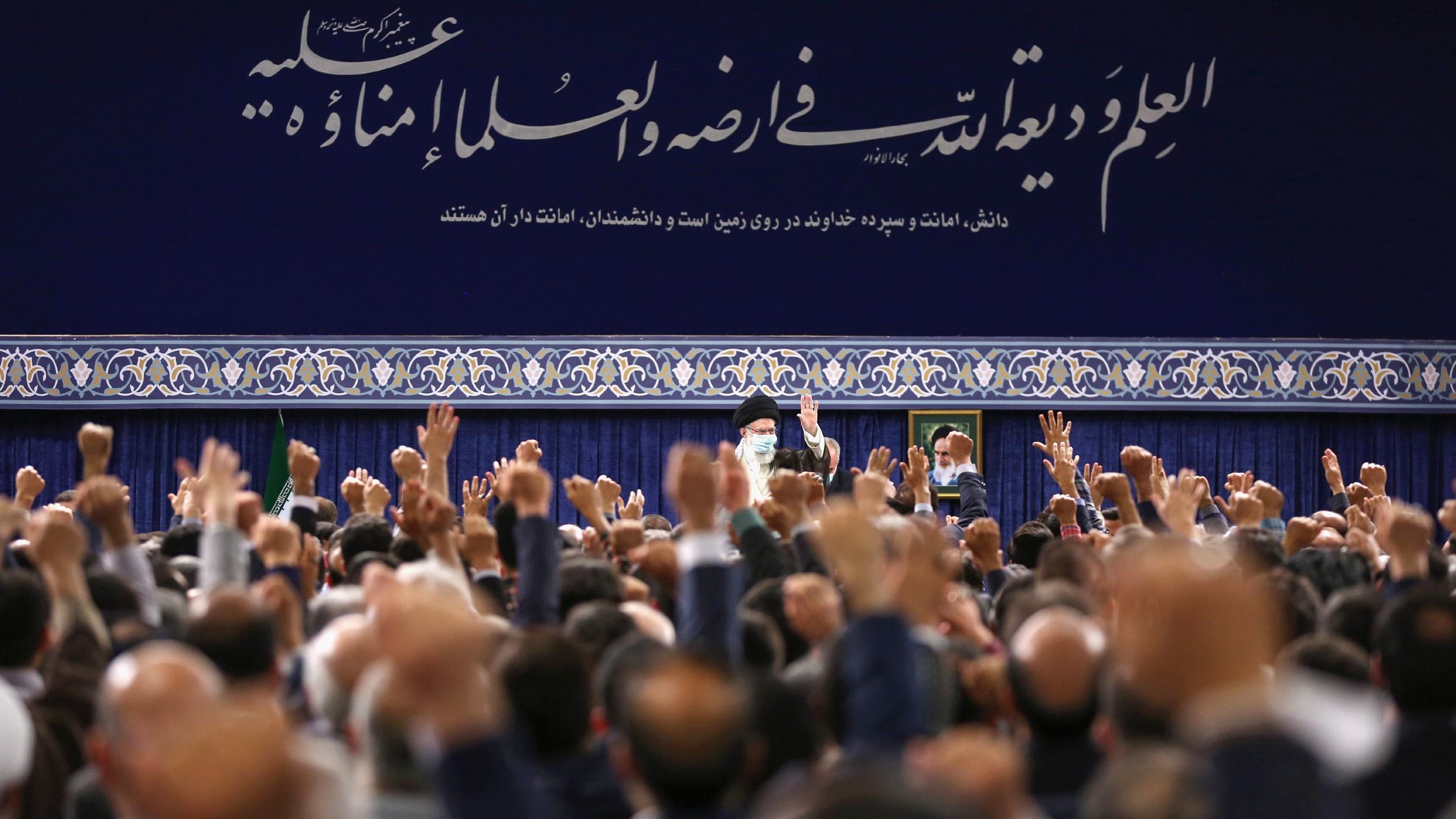 This photo shows Ayatollah Ali Khamenei (center) meeting with scientists, experts, and industry officials during an exhibition of the country's nuclear industry achievements in Tehran, on June 11, 2023. (PHOTO / AFP)
This photo shows Ayatollah Ali Khamenei (center) meeting with scientists, experts, and industry officials during an exhibition of the country's nuclear industry achievements in Tehran, on June 11, 2023. (PHOTO / AFP)
Western countries imposing sanctions on Iran while stalling on their own obligations under an existing nuclear deal with Teheran risks confrontation and potentially destabilizing the middle east, analysts said.
They said the sanctions may compel Iran to increase its nuclear activities against the Joint Comprehensive Plan of Action, or JCPOA, even as countries in the region mend ties with Teheran in recent months.
Abdul Wahed said that it could also lead to an arms race in the region, with neighboring countries feeling compelled to enhance their own missile capabilities in response
Iran signed the JCPOA with the five permanent members of the United Nations Security Council - China, France, Russia, the United Kingdom, and the United States - plus Germany, known as the "P5+1", in 2015. The US unilaterally abandoned the deal in 2018.
READ MORE: Iran: Recent nuke talks with Europe 'explicit, constructive'
The UN has repeatedly said that sanctions violated Iranians’ human rights.
“If the sanctions are retained, there is a possibility that Iran will increase its nuclear activities. This could include expanding its uranium enrichment capabilities, increasing stockpiles of enriched uranium, or even pursuing activities that are prohibited under the JCPOA,” Abdul Wahed Jalal Nori, an assistant professor at the International Islamic University Malaysia, told China Daily.
Abdul Wahed said that it could also lead to an arms race in the region, with neighboring countries feeling compelled to enhance their own missile capabilities in response.
“This escalation could potentially destabilize the already volatile Middle East and increase the risk of conflicts or military confrontations,” said Abdul Wahed.
In a weekly press conference held on July 10, Iranian Foreign Ministry spokesman Nasser Kanaani – responding to a meeting of the UN Security Council on July 6 – slammed Britain, France, and Germany for their "failure to honor their obligations" under the JCPOA.
The UN meeting heard allegations that Iran was stockpiling uranium contravening the JCPOA and supplying Russia with drones.
Iran has always insisted its nuclear activities are peaceful.
Mehran Kamrava, director of the Iranian Studies Unit at the Arab Center for Research and Policy Studies in Doha told China Daily that Britain and the European Union “are violating the terms of the agreement”, which they signed with Iran in 2015.
“During that agreement, they agreed to lift the sanctions by now. But of course, the agreement has been … dead since 2018 when the United States unilaterally decided to withdraw from it,” said Kamrava.
He noted that it took Iran a year to move beyond the terms of the agreement after US withdrawal and now the EU and Britain “have also decided to add to the sanctions and effectively kill the JCPOA”.
“What we therefore have is a need for what is called a new understanding by the different parties of where the parameters of any future agreement or modus vivendi would be,” said Kamrava.
“The anti-Iran atmosphere in the United States, Britain, and the European Union is quite pervasive and politicians in the US, Britain, and the EU are under tremendous pressure so as not to come into an agreement with Iran,” said Kamrava.
He noted Western opposition to the Iranian government’s suppression of demonstrations since September 2022.
“A combination of government policies in Teheran, efforts by opposition lobby groups abroad, and pressure on politicians due to pervasive ‘Iranophobia’ across the West have made the agreement, the nuclear agreement with Iran effectively dead,” he added.
Abdul Wahed in Malaysia said that upholding the JCPOA is the responsibility of all the parties involved and each “must take ownership of their commitments and work toward constructive solutions”.
“It is crucial to prioritize diplomatic engagement, maintain open channels of communication, and demonstrate a shared commitment to the agreement's goals in order to find a sustainable resolution to the current challenges,” said Abdul Wahed.
Gokhan Ereli, Gulf Studies coordinator at the Center for Middle Eastern Studies in Turkiye, told China Daily it is worth noting that Saudi Arabia’s King Salman extended an invitation to Iranian President Ebrahim Raisi to visit Riyadh in recent months.
Ereli noted it was essential to acknowledge that the invitation “remains fragile and susceptible to cancellation in light of negative developments that may arise in Saudi-Iranian relations or the relationships between the United States and Iran, as well as the European Union and Iran”.
READ MORE: Iran, US deny report of nearing interim nuke deal
He said that “any adverse remarks” concerning the recent nuclear agreement talks, actions that jeopardize maritime security, or domestic political dynamics associated with sectarian matters could potentially impede the occurrence of high-level visits between Saudi Arabia and Iran.
Ereli, added, however, that “in a climate where even mutual embassies are opened, in a climate where the foreign ministers of the two countries come together, it is a very possible development for the leaders of the countries to come together”.
“Regional rapprochements can indeed have an influence on the situation surrounding the JCPOA and the broader dynamics in the Middle East. Improved regional relations can potentially create an environment that supports diplomatic efforts and facilitates the resolution of disputes,’ said Abul Wahed from Malaysia.


